Month: April 2014
-
Welcome to hell, here’s your accordion
Most Americans have a view of accordions shaped no doubt by Lawrence Welk and average polka bands. Gary Larson captured the attitude perfectly in this cartoon:

I, however, associate the accordion with sweet, melancholy music like Mary Black’s No Frontiers. It adds a perfect touch to this song:
[youtube=http://youtu.be/3ggeZ9YZYbc]
In my childhood, most of the accordion music I heard was vallenatos. Some were very catchy, like El Mochuelo. I translated this on my Xanga blog a couple of years ago. (My wife Alicia used to sing choruses for these guys, but she didn’t on this song).
[youtube=http://youtu.be/iEN4W8ytKuU]
Today on a whim, I looked for Bach on accordion and found this amazing and perfect rendition of Toccata and Fugue in D Minor:
[youtube=http://youtu.be/eDFFUIGoBUc]
And on the other extreme of the sophistication spectrum, guys my age will remember Weird Al and Another One Rides the Bus:
[youtube=http://youtu.be/tZkouut-9RQ]
-
On finding a niche, fitting in, and accent
Marilyn, in a great post about “Places as possessions,” raised the following questions: “I think a lot of this is about finding our niche. How does our past fit with our present? How can we take the places we’ve loved and the experiences we’ve had and use them in our current reality?”
Finding a niche is tough. Most of the jobs I’ve had (professor of Spanish/English/linguistics; bilingual admin assistant; refugee worker; translator) are a direct outcome of my bilingual/bicultural upbringing. A few of them provided some satisfaction of my desire for meaningful work, but there has always been a longing for more fulfillment. As a professor, I was dissatisfied with my curriculum, my performance, my students’ progress. When I belonged to a Bible translation organization, I worked in training rather than on the front lines, and wondered whether my work made any real difference. Refugee work turned out to include a vast amount of politics, not just helping people who needed help. Working as a translator is frequently tedious and boring.
The most satisfying jobs I have had were in construction. There is nothing quite like framing. You arrive at work in the morning to a bare slab or a raised wood floor. Within a few hours, there are walls standing. Within a few days or weeks (depending on the crew), the entire house is framed, all the way to the rafters! Then begins the fascinating process of sheathing, siding, roofing, wiring, plumbing, a/c, insulation, wallboard, flooring, texturing, painting, trim… When your work is done, you have created a place where a family will live its life.
Interestingly, construction is the one job I’ve had (besides working for a moving company) that doesn’t build on my multicultural background.
Why can’t more jobs be like construction?
***
Last week I had the pleasure of meeting a TCK with an unusual profile. Alicia has a cousin in Costa Rica who has a veterinary supply company. Her husband is a most interesting character; his father is a Spaniard, so the family spoke Catalán at home, but were prohibited from speaking it outside the house. In public they spoke Costa Rican Spanish. He studied in Chile and lived there a number of years before returning to Costa Rica.
When he visited Barcelona, his cousins laughed at the quaint, archaic Catalán dialect he had learned from his father, who was raised in a remote village. I suspect that this was one of the more frustrating experiences in his life, because according to his own admission, he grew up obsessed with fitting in. In Costa Rica he passed as a Tico; in Chile he passed as a Chilean. But in Spain he sounded like a hick.
As we compared stories and worldviews, he grew more and more animated. He talked excitedly about how I could see the world as he did, the flexibility a multicultural upbringing creates and requires, his passion for fitting in.
In listening to him, it struck me that fitting in was never in the realm of possibility for me. I was always bigger, whiter, more blue-eyed than others around me in Colombia. Besides that, I was an introvert by nature. I’ve never fully fit in anywhere.
But I did make sure my Spanish was as good as it could be. My family set a high value on language skills. We spoke better Spanish than most of our fellow missionaries and MKs, and picked up the paisa accent used in Medellín.
***
When I got to college (University of Kansas), my Spanish profs had trouble understanding my thick regional accent, so I switched to more neutral pronunciation. In grad school, I went home for six months to work on my thesis, and quickly adopted the paisa accent even stronger than before. But when my tourist visa expired after three months, I made a trip to Pasto (to cross the border into Ecuador), and was startled to hear myself talking like a pastuso after just one day. Maybe it’s because that’s where I first learned to talk.
I spent a year in the mid-80s working with refugees in Honduras, and learned to say cipote (‘kid’) and vaya pues (‘okay’). The next year I got married and moved to Miami, and worked with Cubans for a couple of years. In the early 90s I moved my family to Costa Rica, where we lived for four years. When I made a trip to Medellín, my old friend Oscar said, “Where have you been living? Your Spanish sounds so ugly!”
In 1998 I got a job in Dallas as a translator. The vast majority of the work involved Mexican Spanish. It was a steep learning curve, but within a few years I picked it up, to the point that when I visited Cartagena (Colombia) in 2008, a taxi driver said I was obviously from Mexico.
Then in 2010 I met Alicia and my life changed forever. I’m back to speaking Colombian Spanish, with a far better vocabulary than I ever had before. In Tampa we interact with Colombians, Venezuelans, Cubans, Puerto Ricans… even a few Mexicans.
My exposure to so many different accents and dialects has been very helpful in my job. But I identify most with Colombian Spanish, especially the paisa accent.
Interestingly, my English doesn’t change much at all, no matter where I live. I wonder why that is.
-
Kitty Heaven
4/3/2014
Those of you who knew me back when Xanga was thriving may remember these two pictures I posted of my fat old cat Pumpkin in early 2010. At the time he had a scratch on his eye that made him squint like Popeye. He generally kept to himself, but once every week or so, he would clamber from the sofa to the end table to my lap so I could pet him.
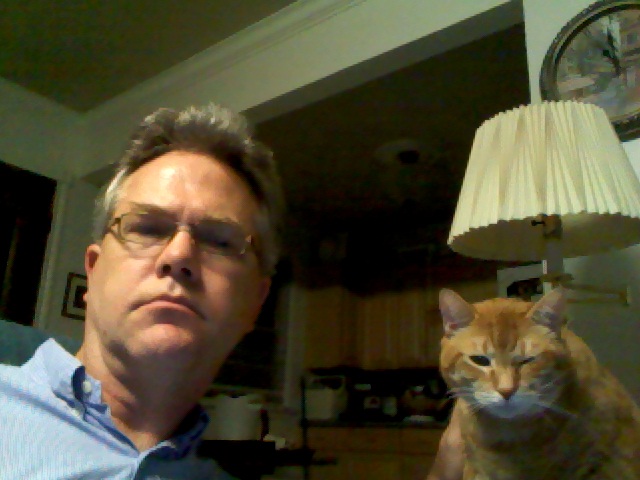

Pumpkin turned up in the Dallas neighborhood where I lived with my family in about 1998. He was an adolescent at the time, not yet full-grown, and was adopted by some neighbors. When they left, my kids adopted him. My son Jephthah especially bonded with him. Pumpkin used to lick Jephthah’s hair very thoroughly.
I took Pumpkin with me when my first wife and I separated in 2001. After a bad flea infestation in 2004, I quit letting him go outside. I inherited another cat, Simon, from a friend in late 2005. Simon got out one November when he sneaked out as I was letting myself in at midnight. I found him on Thanksgiving morning, shivering on the neighbor’s porch. He had spent two or three nights in 32 degree temperatures and was very glad to get back into our warm house.
Pumpkin and Simon had an amicable relationship most of the time.
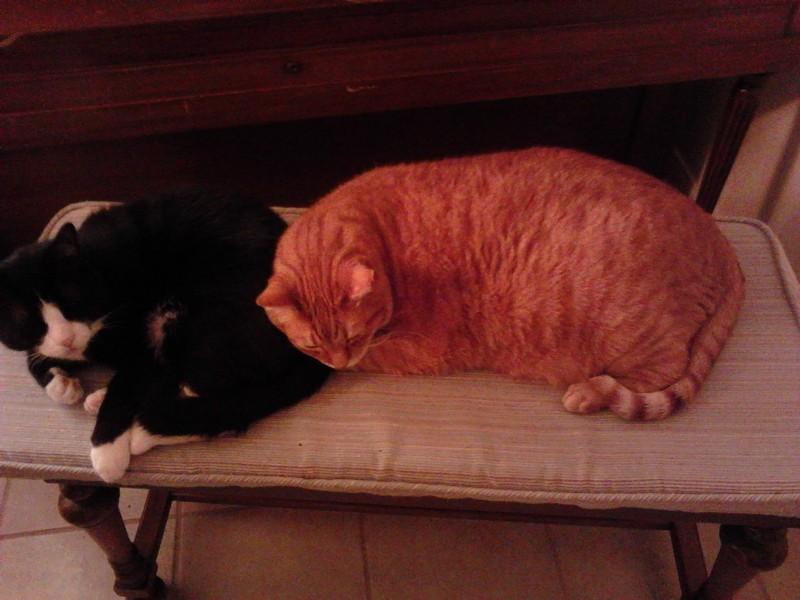
When Alicia and I got married and moved here to the Tampa area, we also brought her two female cats, Ruta and Fortuna, from Medellín. At my insistence, we kept the four of them locked in the lanai because I didn’t want to risk losing them or having another flea infestation.
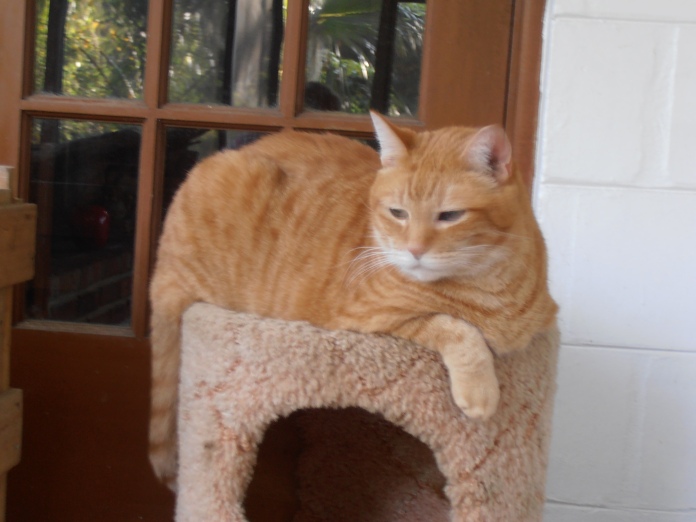
But after a couple of months, Alicia began letting them out into the yard. They were very happy, Pumpkin especially. After nine years of house arrest, he was finally free to explore and to bask in the sunshine.
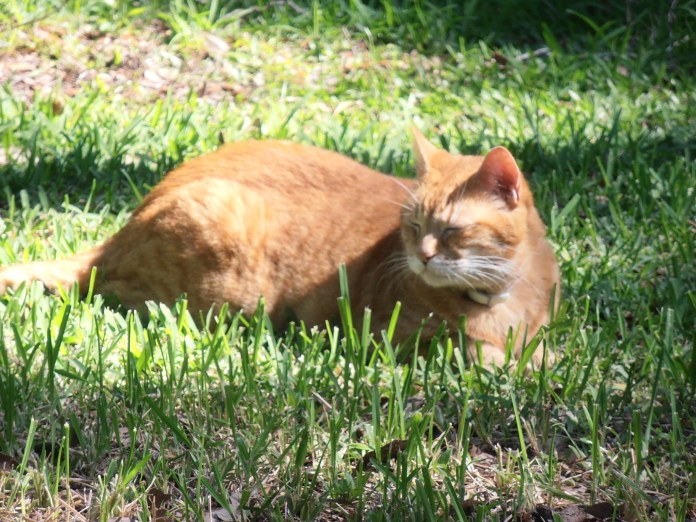
At the time of the eye scratch, Pumpkin weighed nearly 20 pounds! The weight began to come off, though, as he roamed the yard and neighborhood. Occasionally he would even run, his gut swinging from side to side.
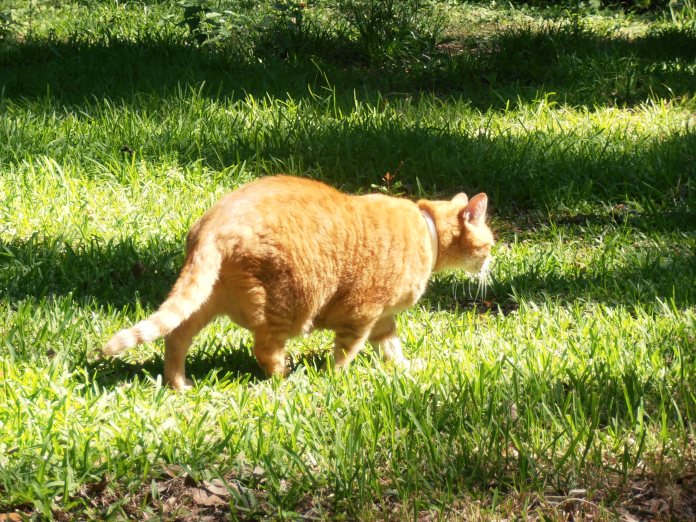
His favorite thing in life was to bask. Often when Alicia went out in the morning to soak up some rays, he would amble over and lie down near her.
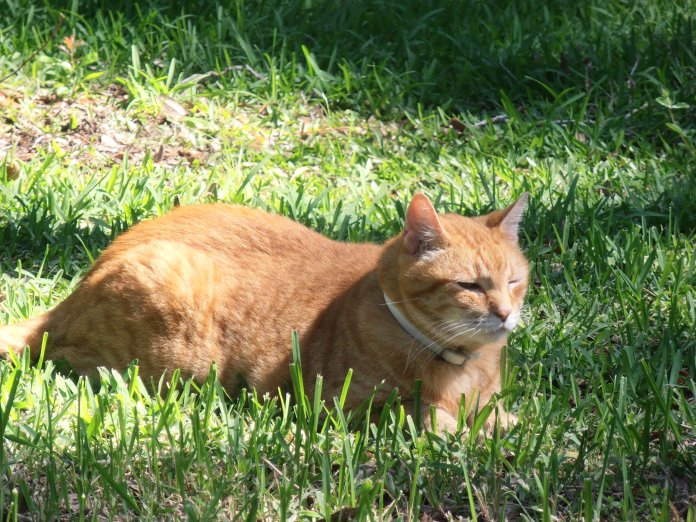
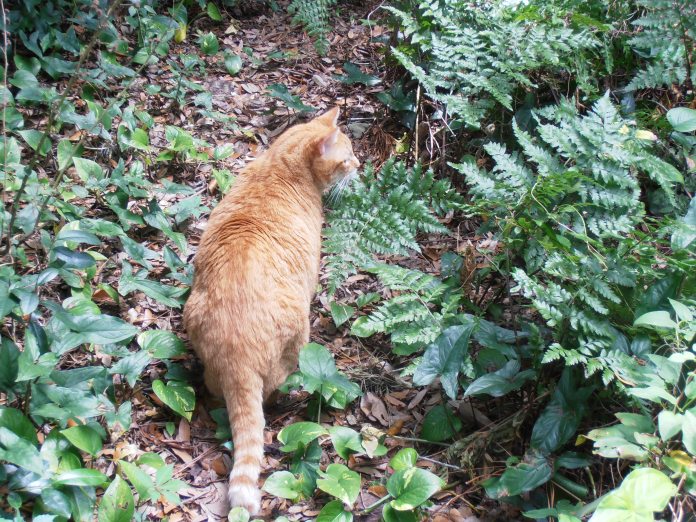
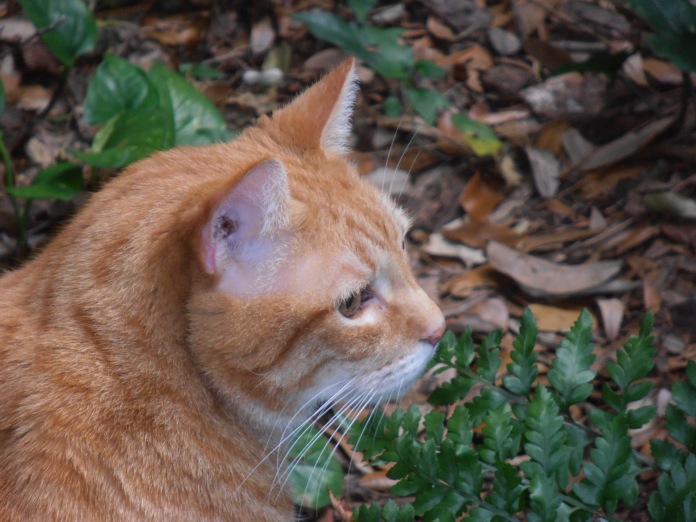
In the last couple of months, he began to limp. I felt the joints of his back legs, but couldn’t find anything out of place. He moved slower and slower, and began spending nights in the lanai of his own accord, always inside one of the little igloos.
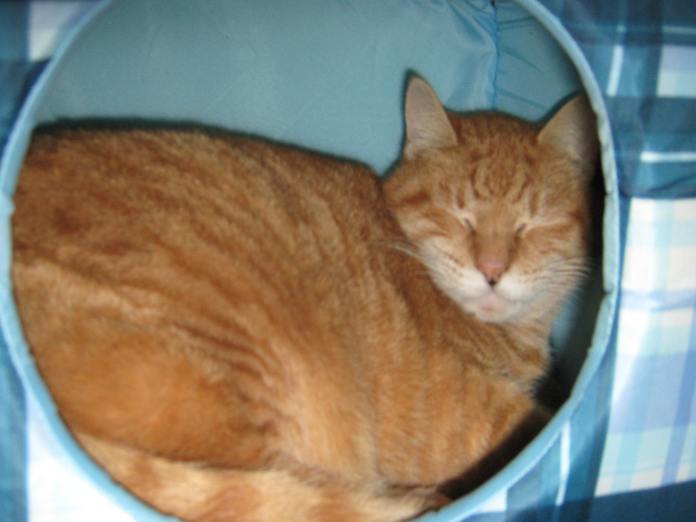
Weekend before last, I was watching him hobble out in the morning, and noticed that his left leg looked odd. I looked at it more closely and was shocked to find a baseball-size swelling all along the back of his thigh. I don’t know how I could have missed it all those weeks when I was checking his legs! He was skin and bones. His spine felt like a saw.
We took him to the vet, and found that it was a tumor. His blood tests showed that he was anemic, but didn’t seem to have an infection. Surgery would have required amputation, so we took him back home, figuring we’d have him put to sleep when it became clear that he was suffering.
Saturday, Alicia and I worked in the yard. Pumpkin crawled out to a sunny patch of grass, lay down, and didn’t move all day. There were shiny green flies pestering him, so I draped an old t-shirt over his hindquarters, which he hadn’t been cleaning very well. That helped keep them away. When Alicia carried him into the lanai that night, he refused food and water and crawled into his igloo.
Yesterday morning, he was very lethargic, and his igloo was wet underneath. We knew the time had come to put him to sleep. I carried him out to the sunshine, igloo and all, to let him bask one last time. Alicia and I ate breakfast, and I tackled my income taxes, putting off the inevitable moment. When we finally went out to take him to the car, he was already gone, his body still curled up inside the igloo.
We chose a resting spot in the back yard along the fence. I dug a deep hole. We laid him in a shallow cardboard box, thanked him for his 17 years of faithful pethood, and put him in the ground.
At Lowe’s we found a nice little lime tree, which we planted over him. Alicia talked about how, if there’s a kitty heaven, he’s exploring the hedges, loping through the grass, or basking in the sun, free of pain.
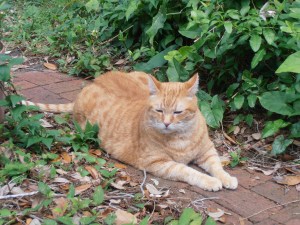

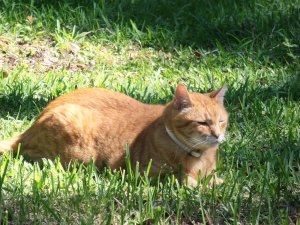
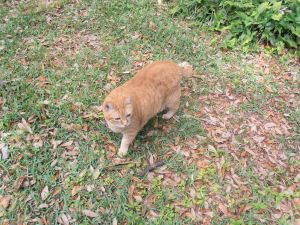
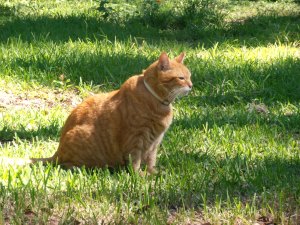

Alicia and I have been reading The Wind in the Willows out loud. Last night just happened to be the chapter called “The Piper at the Gates of Dawn.” (You can click on the title to read it.) Mole and the River Rat spend a night searching for their friend Otter’s lost son Portly. At dawn they have a mystical encounter with Pan, the god of animals, who returns Portly to them. It’s a gorgeous and moving episode, and we couldn’t help but see a divine coincidence in its timing.
So goodbye, Pumpkin. I’m glad you aren’t suffering anymore. You were a joy and a blessing to us, and we are grateful.
-
Add New Post
4/9/2014 – My workplace computer has software that blocks some screens in WordPress and not others. One interesting result is that I can add a post from Add New Post, but can’t edit it once I save it. I think I wrote the beginnings of something the other day, but I can’t see it now to finish it.
I can’t get into Xanga at all from the office.
Stuff going on:
Alicia recently discovered that she needs to get to Colombia in time for an event scheduled for April 21. This has meant scrambling for airfares and a place for her to stay while she’s there and last-minute purchases of gifts or items to sell. I was a bit stressed by it, because I had thought we had until May to arrange her travel, but then I discovered that airfares are considerably cheaper in April. So that helped counter the stress.
In the meantime, I have a work trip to Panama City, Florida starting this weekend. Rather than fly, I’m going to take a rental car. It saves my agency money, and this way I can take Alicia along. We’ll go up this Friday and stay until things are done, probably the next Thursday. Then we’ll rush back to Tampa in time for her to catch Friday morning flights to Ft. Lauderdale and Medellín.
While Alicia is gone, I’m planning to tear out the vinyl floor in the breakfast room and kitchen and put down tile. Then I’ll do the laundry room. After that, I’ll tape and paint the stairway walls. I want to get as much messy open-space work done as I can before her return, since she hates dust and disorder. I can work on bedroom remodels after she gets back, because I can simply close a door to keep the dust from spreading.
In early June, my younger daughters will visit from Dallas for a week, overlapping with my sister Jenny and niece Paige who will be visiting from Lincoln, NE. We might actually get to one of the Orlando theme parks.
Also on my mind:
Finances have been tight since my Texas lake house’s septic tank failed last year. The expense of a new tank and the loss of the renters mean that I struggle every month to pay my bills. I’ve had the house on the market but there have been no serious bites and very few visitors. I’m going to lower the price this week and see if it gets more attention. At some point I may have to dump it at a fire sale price and forget about recovering any equity. Buying it was one of the stupidest decisions of my life.
We have been planning to sell our Tampa house as soon as it is feasible. I hate the thought, because it really is my dream house, but a) we should be able to make some money on it and b) the circumstances that brought us to Tampa are changing. By the time I finish the upgrades, it will be a spectacular place, inside and out, so it should sell well.
Reading:
I am rereading my collection of Charles Williams novels. Brilliantly written. The closest thing I can think of in my very limited knowledge of modern American literature is Ted Dekker, but Dekker is considerably more flamboyant and sensationalistic. In Williams’s writing, I appreciate the quiet, confident, cheerful faith of the Archdeacon in War in Heaven, and of Stanhope in Descent into Hell. Perhaps Leif Enger’s Peace Like A River comes closer than Dekker in caliber of writing and the portrayal of faith, although Enger is not nearly as esoteric.
I have also read (from the lunchroom bookshelf at work) three Lee Child books about Reacher, a hobo who dispenses justice wherever he goes, using skills he learned as an MP in the army. Lots of fun, and usually a massive explosion or fire at the end.
Alicia and I have finished The Wind in the Willows and are reading Jingo! by Terry Pratchett. The translation to Spanish is quite good, although we run across terms from Spain that are unfamiliar to both of us. This is my third time to read Jingo! and I’m enjoying it just as much as the first.


![IMG_20140417_205356[1]](http://roadkillspatula.files.wordpress.com/2014/04/img_20140417_2053561.jpg?w=225)